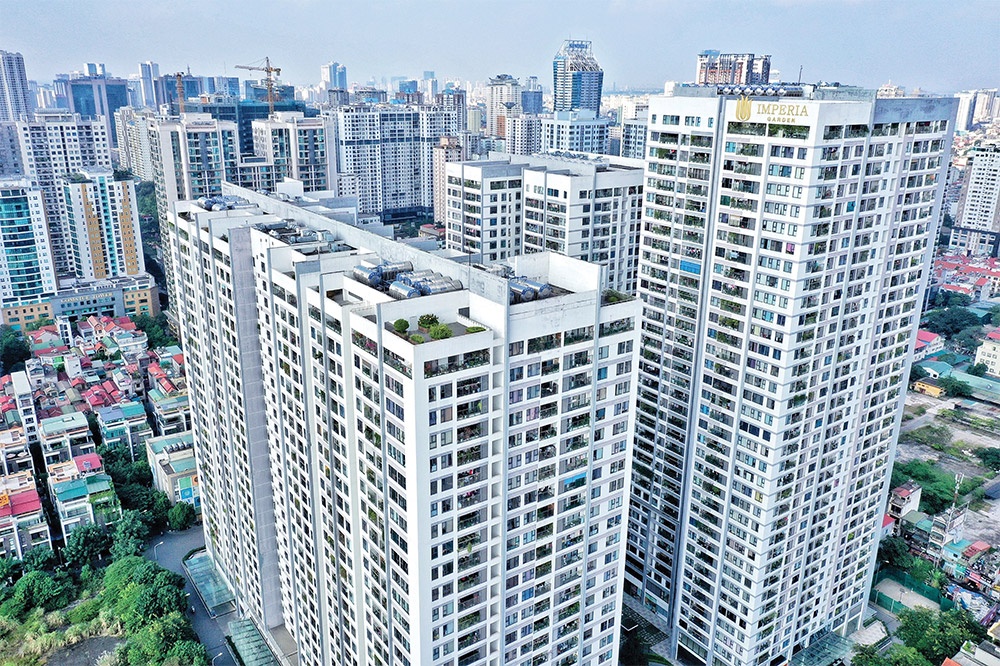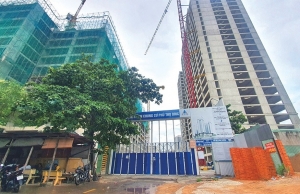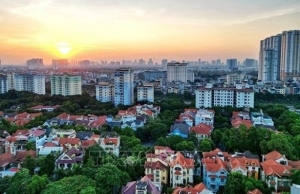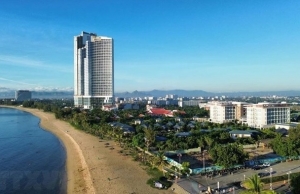Sentiment robust from foreign real estate investors
 |
| A raft of new offerings are in the pipeline or underway in some of Vietnam’s biggest cities, photo Le Toan |
According to the Foreign Investment Agency under the Ministry of Planning and Investment, in January, the registered capital of foreign direct investment (FDI) increased sharply and the disbursement of FDI also surged.
The total capital registered in Vietnam in January reached $2.36 billion, an increase of more than 40 per cent on-year.
Up to $1.27 billion of such capital was poured into the real estate sector, accounting for 53.9 per cent of total registered capital and doubling compared to January 2023.
The increase in FDI into Vietnam and the breakthrough in the real estate sector are opening up many promising opportunities, especially in the manufacturing sector. Improvements in infrastructure development, administrative procedure reform, and investment in innovation centres in Vietnam are also contributing to making the market attractive to international financiers.
Fitch Ratings has also recently upgraded Vietnam’s long-term national credit rating to BB+ with a “stable” outlook.
Meanwhile, the retail market also recorded vibrant activities from foreign investors. In September 2023, Lotte Group opened its new mall in Hanoi’s Tay Ho district, while THISO opened its third Emart hypermarket in Ho Chi Minh City and plans to put money in the north after purchasing a 2.4 hectare land plot in the capital.
In the last months of 2023, many large developers launched new housing products, including The Privia project in Ho Chi Minh City, and Canopy Residences and Lumière Evergreen projects in Hanoi. The next phases of the Akari City and Glory Heights projects have also been launched in Ho Chi Minh City.
Meanwhile, Gamuda Land from Malaysia is proceeding with three new projects: Eaton Park and Elysian in Ho Chi Minh City, and Artisan in Binh Duong province.
Singaporean giant CapitaLand is moving forward with its mega project called Lumi in Hanoi and is also slated to start its first project in Binh Duong, Sycamore, imminently.
Matthew Powell, director of Savills Hanoi, commented that upcoming new laws on land, housing, and real estate have given a boost to the property landscape.
“The adoption of these laws can be seen as a positive signal for the investment market in the next year, boosting confidence. The Vietnamese market with real demand for housing as well as confidence in the office and industrial real estate sectors will be the key to the start of a new cycle this year. However, we still need to wait for the legal documents to be able to observe clearer changes,” Powell said.
Meanwhile, CBRE carried out a survey on Asia-Pacific investor intentions, conducted in November and December, involving more than 500 people answering a range of questions related to their buying intentions, perceived challenges, and preferred strategies for the coming year.
According to the survey, Vietnam secured second position among the most sought-after emerging markets for added value and opportunistic strategies. This ranking places Vietnam just behind India in terms of attractiveness.
“Vietnam’s market presents a unique landscape where portfolios consisting of income-producing assets are scarce and typically not available for sale. As a result, most investors in Vietnam focus their attention on industrial and office assets, aligning with the prevailing trend observed across the Asia-Pacific region,” read the survey.
Duy Nguyen, investment properties director at CBRE Vietnam, commented that Vietnam’s robust economy and export-oriented strategy have propelled trade activities, thereby underscoring the critical importance of efficient logistics and supply chain management.
“Investors recognise the potential in supporting and capitalising on these requirements, further driving the demand for industrial assets,” Duy said.
Additionally, residential development sites in Vietnam continue to generate strong interest from foreign developers.
“Many are actively exploring opportunities in distressed assets or properties owned by landlords facing legal challenges or limited access to funding sources,” he added. “Investors with a long-term view on the potential of Vietnam’s economy and ready to deploy capital are most likely to reap the benefits of the repricing and decompression of asset yields. This is particularly true when sellers are seeking to exit at the conclusion of their investment window.”
| Nicolas Michaux, Founder, Alpha Prime
The real estate market in Vietnam has been facing challenges in the past two years. However, the market is expected to recover in 2024 and accelerate in 2025, thanks to the government’s efforts to stimulate the economy, improve the legal framework, and allure foreign investment. One of the key factors that will boost the market in the coming years is the enactment of the three new laws related to the real estate sector. They aim to provide more clarity, transparency, and consistency in the regulations governing the real estate market, as well as to protect the rights and interests of both developers and buyers. Some of the notable changes introduced by these laws include expanding the range of property types and real estate products that can be traded, such as mixed-use works, separate floor areas, and land use rights with technical infrastructure. It also clarifies the requirements and conditions for different types of investors in the real estate market, such as domestic and foreign individuals and organisations, and exempting some foreign-owned enterprises from the procedures applicable to foreign backers. Furthermore, it regulates the sale and purchase of land use rights, requires the land to have existing technical infrastructure, and prohibits the sale of bare land areas and sets out the eligibility and conditions to transfer a real estate project, such as having a valid investment certificate, completing the compensation and site clearance, and obtaining the approval of the competent authorities. Foreign investors will also have more opportunities to participate in real estate, especially in the segments of industrial, office, retail, and hospitality, which are expected to see strong demand and growth potential. Therefore, the real estate market in Vietnam is poised to become one of the most attractive and dynamic markets in the region. Aidan Wee, CEO, PropNex WeeReal
The new laws are received with optimism and positivity from foreign investors, there is a widespread feeling that the government is finally addressing the loopholes and conflicting legislation to the laws governing the real estate market. The 2023 amended Law on Real Estate Business finally provides clear directives for a regulated marketplace. To name a few key changes: real estate developers will now need to use government prescribed contract templates, are allowed to collect deposit of up to a maximum of 5 per cent only, and can publish all real estate project information on the Ministry of Construction’s residential housing information system. As for the new Law on Housing, it is now worded that foreigners need not only purchase residential real estate from real estate developers in the primary market, but also directly from other foreigners that are rightful owners of permitted residential real estate in Vietnam. The new land law promises to unlock legal bottlenecks in increasing the primary supply of residential housing projects by streamlining the legal process for acquiring approvals. With the three new laws related to the real estate market, it feels that the government has learned from the practical implementation and conflicting nature of the previous laws. From a foreign investor point of view, this is all superb news that the market will move upwards again as the amendments will lead the market to become more transparent, see housing prices return to more realistic levels, and curb the speculative nature of residential real estate in Vietnam. Vietnam’s real estate in the long term will be more sustainable and this will create a strong foundation. With new laws taking effect in 2025, most investors will still adopt a wait and see attitude. |
 | More social housing among urgent acts in construction The construction sector is aiming for moderate growth in 2024 amid numerous challenges, as tackling sector bottlenecks again remains top of the Ministry of Construction’s agenda. |
 | Experts upbeat about real estate prospects Experts from top real estate consulting companies in Vietnam have expressed optimism about development prospects of the real estate market, particularly regarding the office and industrial segments. |
 | Resort real estate market shows positive signs The resort real estate market is recording positive signs as demand, in both domestic and international tourist markets, is gradually recovering at a stable pace, thereby helping strengthen trust in the industry, according to Mauro Gasparotti, Director of Savills Hotels. |
What the stars mean:
★ Poor ★ ★ Promising ★★★ Good ★★★★ Very good ★★★★★ Exceptional
Related Contents
Latest News
More News
- Construction firms poised for growth on public investment and capital market support (February 11, 2026 | 11:38)
- Mitsubishi acquires Thuan An 1 residential development from PDR (February 09, 2026 | 08:00)
- Frasers Property and GELEX Infrastructure propose new joint venture (February 07, 2026 | 15:00)
- Sun Group led consortium selected as investor for new urban area (February 06, 2026 | 15:20)
- Vietnam breaks into Top 10 countries and regions for LEED outside the US (February 05, 2026 | 17:56)
- Fairmont opens first Vietnam property in Hanoi (February 04, 2026 | 16:09)
- Real estate investment trusts pivotal for long-term success (February 02, 2026 | 11:09)
- Dong Nai experiences shifting expectations and new industrial cycle (January 28, 2026 | 09:00)
- An Phat 5 Industrial Park targets ESG-driven investors in Hai Phong (January 26, 2026 | 08:30)
- Decree opens incentives for green urban development (January 24, 2026 | 11:18)



 Tag:
Tag:




















 Mobile Version
Mobile Version